10 Tips to Improve Joint Attention Skills to Support Language Development

Joint attention skills play a crucial role in the development of language and communication abilities in children. Joint attention refers to the ability to share attention with others towards a common object or event. When children engage in joint attention, they can better understand and respond to verbal and non-verbal cues, fostering language acquisition. In this blog post, we will explore effective tips to enhance joint attention skills, thus supporting language development in children.
1. Establish a Structured Environment
Creating a structured environment is essential to promote joint attention skills. Arrange the environment to minimize distractions and encourage focus on shared activities. Clear clutter and remove unnecessary toys or objects that may divert attention. This provides a conducive setting for joint attention and helps children concentrate on the task at hand.
2. Follow the Child’s Lead
When engaging in activities with a child, follow their lead and interests. Observe what captures their attention and tailor activities accordingly. Incorporating their preferred toys or topics increases their motivation to participate and sustain joint attention actively. This personalized approach encourages children to engage actively and initiates communication.

3. Use Visual Supports
Visual supports, such as pictures, visual schedules, or visual aids, can be powerful tools to enhance joint attention. These visuals provide a clear visual reference and make it easier for children to understand and follow instructions. Incorporating visuals into daily routines and activities encourages joint attention by providing a shared point of focus and facilitating communication.
4. Engage in Interactive Play
Interactive play is an excellent way to foster joint attention and language development. Choose activities that encourage turn-taking, sharing, and cooperation. Games like peek-a-boo, building blocks, or pretend play facilitate joint attention by creating shared experiences and promoting communication. Parents and caregivers can model appropriate language and social skills by actively participating in play, further enhancing language development.
5. Incorporate Joint Attention Routines
Establishing joint attention routines helps children develop a sense of predictability and structure. For example, engage in joint attention during mealtime by labeling and talking about different foods and describing their tastes or textures. This routine encourages joint attention while expanding vocabulary
and language skills. Similarly, incorporating joint attention into daily activities like bath time or bedtime routines can create opportunities for shared focus and language-rich interactions.
6. Utilize Gestures and Pointing
Gestures and pointing are powerful tools for promoting joint attention and language development. Encourage children to use gestures to request or share information and respond positively when they attempt to communicate non-verbally. Similarly, model pointing to objects, pictures, or symbols during conversations to draw the child’s attention and reinforce joint attention skills.

7. Stay face-to-face with your child
Being face-to-face while communicating is a vital component of joint attention. Get children’s attention during interactions by getting down to their eye level and using verbal and non-verbal prompts. Sustain eye contact and interest during joint attention activities to strengthen the connection and reinforce the importance of shared focus.
8. Break Tasks into Manageable Steps
Complex tasks can be overwhelming for children with developing joint attention skills. Break tasks into smaller, manageable steps, and provide clear instructions for each step. This approach helps children understand and follow the sequence of activities, promoting joint attention and language development.
9. Provide Positive Reinforcement
Positive reinforcement plays a significant role in motivating children to engage in joint attention and language-building activities. Offer praise, encouragement, or small rewards when children successfully maintain joint attention or make progress in their communication skills. Positive reinforcement creates a positive association with joint attention, fostering a desire to engage more frequently.
10. Seek Professional Guidance
If you have concerns about your child’s joint attention skills or language development, do not hesitate to seek professional guidance. Speech and Language Pathologists and developmental specialists can provide valuable assessments and interventions tailored to your child’s specific needs. They can offer personalized strategies and resources to effectively support joint attention and language development.
Enhancing joint attention skills is a valuable strategy to support language development in children. By creating a structured environment, using visual supports, engaging in interactive play, and incorporating joint attention routines, parents and caregivers can help children improve their language skills. By following these tips and providing positive reinforcement, we can effectively promote joint attention and provide a strong foundation for children’s language acquisition and communication abilities.
If you are interested in speech therapy services, please contact us: Therapy Services – Speech Improvement Center
If you are interested in speech therapy careers, please contact us: Employment Opportunities – Speech Improvement Center
Check our locations here: Locations – Speech Improvement Center